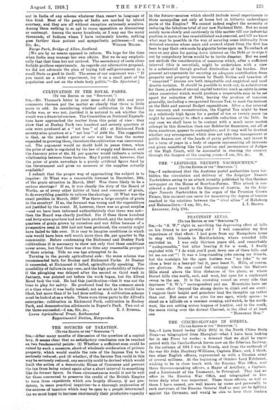THE SOURCES OF TAXATION.
[To TRY EDITOR or THE " SPECTATOR."] SIR,—After many months of discussion of the question of a capital levy, it seems clear that no satisfactory conclusion can be reached on two fundamental points: (1) Whether a sufficient sum could be raised by such a measure, short of wholesale confiscation of private property, which would enable the rate of the Income Tax to be seriously reduced; and (2) whether, if the Income Tax could in this way be seriously rednoed, any security could be devised which would limit the action of a democratic House of Commons and prevent the tax from being raised again after a short interval to something like its former figure. In these circumstances would it not be well for those concerned to preserve the credit of the British Empire to turn from expedients which are largely illusory, if not pre- datory, to more practical inquiries—to a thorough exploration of the sources of taxation which may be open to a people determined (as we must hope) to increase enormously their productive capacity in the future—eourcee which should include novel experiments in State monopolies not only at home but in hitherto undeveloped parts of the Empire P We cannot indeed neglect the necessity of reducing the fabulous total of our new National Debt. But we must surely move slowly and cautiously in this matter till our industrial position is more or less re-established and ensured, and till we know what may be possible in the way of securing some indemnity from defeated enemies whose main and avowed objeot from the first has been to pay their own costs by gigantic levies upon us. To embark at once on any plan for paring down interest on the Debt or to wipe it out by compulsory levies would be to invite disaster. But we need not exclude the consideration of measures which, after a sufficient interval (this is essential), might be undertaken with a view to a substantial though gradual diminution of the burden. Our present arrangements for securing an adequate contribution from property and property incomes by Death Duties and taxation of " unearned " income are both inequitable and empirical and need drastic revision. It should be possible to work out, in substitution for these, a scheme of annual capital taxation (such as exists in some other countries) which would produce a respectable sum to be set apart for reduction of Debt, leaving the produce of taxation generally, including a reorganized Income Tax, to meet the interest on the Debt and annual Budget expenditure. After a due interval for recovery and reconstruction, the Capital Tax might be fixed at a relatively high figure for a period of ten or twenty years (as might be necessary) to effect a sensible reduction of the Debt. In any case we shall have to be content with a much more modest attempt in this direction than our Bolshevist financiers, not all of them amateurs, appear to contemplate; and it may well be doubted whether any arrangement which does not take the management of public finance out of the ,hands of party politicians, and invest it for a term of years in a body of experts representing all interests and given something like the position and permanence of Judges of the High Court, will be successful in steering the country through the dangers of the coining years.—I am, Sir, &c., M.


























 Previous page
Previous page